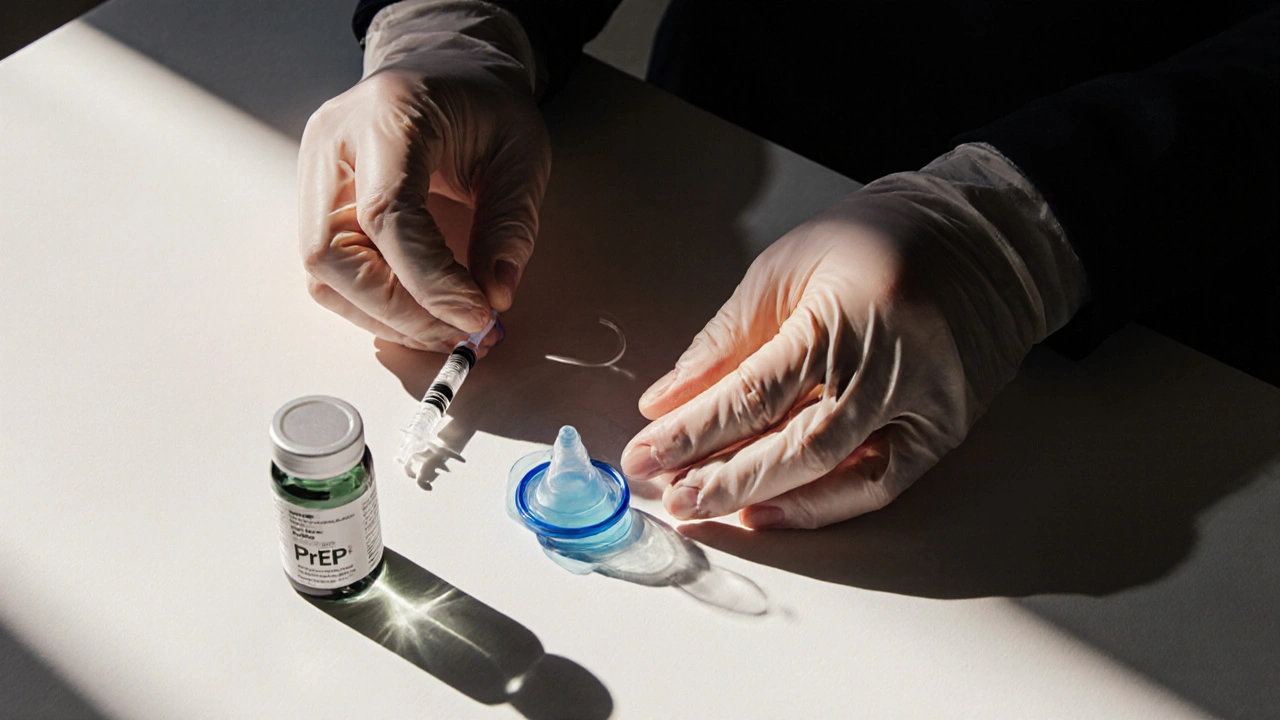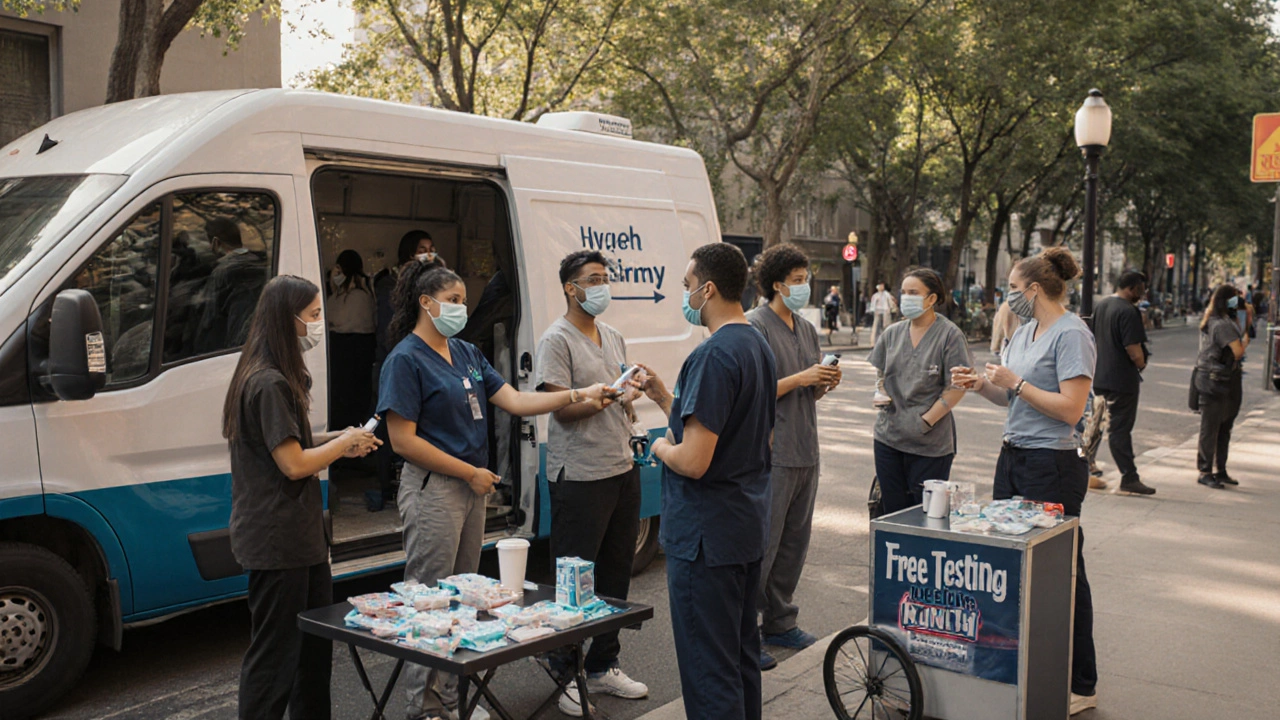Sex work is work. And like any job, it comes with health risks that need real, practical solutions-not judgment or silence. If you’re doing sex work, your body isn’t a risk to be managed by others. It’s your body, and you deserve access to care that’s easy, affordable, and respectful. This isn’t about morality. It’s about staying healthy, safe, and in control.
Why STI Testing Isn’t Optional
| STI | Test Type | How Often | Why It Matters |
|---|---|---|---|
| Chlamydia | Urine or swab | Every 3 months | Often symptom-free; can cause infertility if untreated |
| Gonorrhea | Urine or swab | Every 3 months | Can infect throat, rectum, genitals; spreads quickly |
| HIV | Blood test | Every 3-6 months | Early detection means effective treatment and no transmission |
| Syphilis | Blood test | Every 3 months | Can cause serious damage over time if missed |
| HPV | Visual exam + Pap smear (if applicable) | Annually if cervix present | Linked to cervical and throat cancers |
| Hepatitis B & C | Blood test | Annually | Hep B is preventable with vaccine; Hep C is curable |
Testing every three months isn’t excessive-it’s standard. Many clinics offer walk-in, anonymous, and free testing for sex workers. In Perth, organizations like the Perth Sexual Health Centre a public health clinic offering free and confidential STI testing and treatment for sex workers and other vulnerable populations have dedicated hours for sex workers. You don’t need ID. You don’t need to explain yourself. You just show up.
Waiting for symptoms? That’s how infections spread. Chlamydia and gonorrhea often have no signs at all. By the time you feel pain or discharge, you might have already passed it on-or caused damage you can’t undo. Regular testing isn’t about fear. It’s about confidence. Knowing your status lets you make informed choices with clients and partners.
Vaccinations That Save Lives
Not every infection needs to be treated. Some can be stopped before they start. Vaccines are one of the most powerful tools sex workers have-and they’re often free or low-cost.
- Hepatitis B: One of the easiest to prevent. It spreads through blood and sexual fluids. The vaccine is three shots over six months. Most health clinics give it for free. Once you’re vaccinated, you’re protected for life.
- HPV (Human Papillomavirus): Causes genital warts and cancers. The vaccine works best before exposure, but even if you’ve had sex, it can still protect against strains you haven’t encountered. Available up to age 45 in Australia. Free for some under government programs.
- Hepatitis A: Spread through contaminated food or close contact. Less common in high-income countries, but still a risk if you travel or work in crowded spaces. One or two shots give long-term protection.
Many sex worker support groups in Australia run mobile vaccination clinics. You can get your shots while getting a coffee, picking up condoms, or chatting with peer workers. No appointment needed. No stigma. Just care.
Prevention: It’s More Than Condoms
Condoms are essential. But they’re not the only tool. Real prevention means layering strategies.
- Internal and external condoms: Use both if you’re doing anal or vaginal sex. Internal condoms give you control-you can insert them hours before sex. External condoms are widely available at clinics and community centers.
- Lubricant: Water-based or silicone-based lube reduces friction. Less friction means fewer tears in skin or mucous membranes. Less tearing means less chance of infection. Always use lube. Always.
- Pre-exposure prophylaxis (PrEP): If you’re at risk for HIV, PrEP is a daily pill that reduces transmission by over 99% when taken correctly. It’s free in Australia through the PBS. You don’t need to be ‘high risk’ to qualify. If you’re having sex with multiple partners, you qualify.
- Post-exposure prophylaxis (PEP): If a condom breaks or you’re exposed to HIV, PEP is a 28-day course of pills you can start within 72 hours. It’s not a backup plan-it’s an emergency tool. Know where to get it fast.
- Screening your clients: Ask if they’ve been tested recently. Don’t feel bad asking. It’s a normal part of your job safety. If they’re uncomfortable, that’s their issue-not yours.
Some workers use apps to share anonymous health updates with peers. Others keep a simple notebook: ‘Tested June 2025. No symptoms. PrEP on. Lube always.’ It’s not paranoia. It’s professionalism.
Barriers to Care (And How to Bypass Them)
It’s not just about knowing what to do. It’s about getting there.
Many sex workers avoid clinics because of fear: fear of being judged, reported, or refused service. But here’s the truth: in Australia, healthcare providers are legally bound to keep your work status private. You don’t have to tell them you’re a sex worker. You don’t have to say anything at all.
Some clinics have sex worker liaisons-staff trained to understand your needs. In Melbourne, Sydney, and Perth, peer-led organizations like SWOP Australia a national network of sex worker-led organizations providing health support, advocacy, and peer education offer outreach services. They come to you. They bring tests, vaccines, lube, and condoms. They don’t ask for your name.
Language barriers? Translation services are free in public clinics. Transportation? Some groups offer taxi vouchers. Childcare? Peer workers help arrange it. You’re not alone. There are systems built for this.

Your Body, Your Rules
Sex work is work. And like any job, you have the right to a safe workplace. That includes access to testing, vaccines, and prevention tools. No one else gets to decide what safety looks like for you.
Don’t wait for someone to offer you care. Go get it. Walk into a clinic. Call a peer worker. Text a friend who’s been tested. Use your network. You’re not asking for a favor. You’re claiming your right to health.
Every test you take. Every vaccine you get. Every condom you use. It’s not just protection. It’s power. It’s saying: I’m not a statistic. I’m a worker. And I deserve to stay healthy.
Do I need to tell a clinic I’m a sex worker to get free STI testing?
No. You don’t have to say anything about your work. Clinics in Australia offer confidential, anonymous testing. You can just say you’re due for a check-up. They won’t ask for proof of employment or report your status to anyone.
Can I get PrEP if I’m not Australian?
Yes. If you’re in Australia on a valid visa (including tourist or student visas), you can access PrEP through the Pharmaceutical Benefits Scheme (PBS) at the same subsidized rate as citizens. You need a prescription from a doctor, but many clinics have doctors who specialize in sex worker health and can help you get one quickly.
Are condoms 100% effective at preventing STIs?
No. Condoms are highly effective-over 95% against HIV and gonorrhea when used correctly-but not perfect. Some STIs like herpes or HPV can spread through skin-to-skin contact in areas not covered by a condom. That’s why testing, vaccines, and lube are all part of a layered approach. Don’t rely on one tool alone.
What if I can’t afford to get tested?
In Australia, STI testing is free at public sexual health clinics. You don’t need Medicare. You don’t need proof of income. Some organizations even offer free transport vouchers or childcare so you can get tested without losing income. Reach out to SWOP Australia or your local sex worker support group-they’ll help you get there.
Is it safe to get vaccinated while working?
Yes. Vaccines like Hep B and HPV are safe and don’t interfere with your work. Some people feel slightly tired or have a sore arm for a day, but most feel fine. Many sex workers schedule shots on their day off or during clinic hours that fit their schedule. You can keep working normally after getting vaccinated.
Next Steps: What to Do Today
- Find your nearest sexual health clinic. Search online for ‘free STI testing near me’ + your city.
- Call ahead and ask if they have sex worker-friendly hours or peer support workers.
- Ask for a Hep B and HPV vaccine if you haven’t had them.
- Ask your doctor about PrEP if you’re not already on it.
- Keep a small stash of condoms and lube in your bag, car, or phone case. Always.
Health isn’t a luxury. It’s the foundation of your work. You don’t have to wait for permission to protect yourself. You already have the right. Now go claim it.
